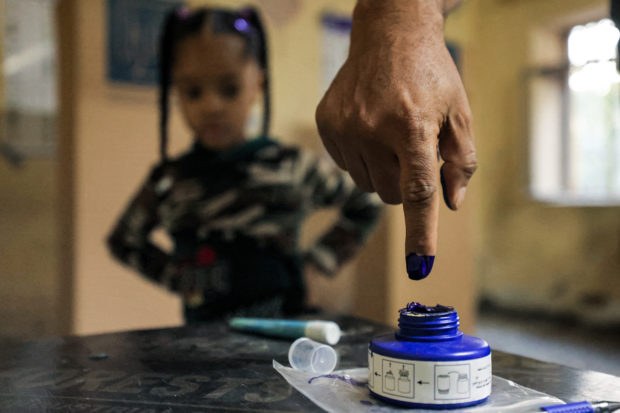
A man dips his finger in ink after voting at a polling station in Iraq’s capital Baghdad during the early parliamentary elections on October 10, 2021. AFP
BAGHDAD — Preliminary turnout figures Monday showed many citizens boycotted Iraq’s parliamentary election, held a year early to appease protestors, in an oil-rich country riddled by corruption and beholden to armed factions.
In what was the fifth election since the 2003 US-led invasion that ousted dictator Saddam Hussein with the promise of bringing freedom and democracy, preliminary turnout was just 41 percent, based on results from 94 percent of voting stations, the electoral committee said.
The vote was brought forward from 2022 as a rare concession to a protest movement that erupted in 2019 against graft, unemployment and poor public services, but which fizzled out amid major intimidation and the onset of the coronavirus pandemic.
Prime Minister Mustafa al-Kadhemi’s future hangs in the balance, with few observers willing to predict who will come out on top after the usual political haggling between factions that follow Iraqi elections.
“Get out there and vote, change your reality, for Iraq and for your future,” said Kadhemi, casting his ballot. He later tweeted that he had “kept his promise and done his duty by organizing fair elections”.
Polls closed at 1500 GMT on Sunday, with electoral commission chief Jalil Adnan saying preliminary results would be known within 24 hours.
The preliminary turnout falls below even that recorded in 2018, when 44.5 percent of eligible voters cast ballots.
Viola von Cramon, who heads a team of EU observers, had late Sunday lamented the turnout, as partial data emerged.
“This is a clear political signal, and one can only hope that it will be heard by the politicians and by the political elite of Iraq,” she said.
‘Incompetent leaders’
Few voters expressed enthusiasm among those who queued in the fifth election since the 2003 US-led invasion that ousted dictator Saddam Hussein with the promise of bringing freedom and democracy.
“We want change,” said Mohammed, 23, who declined to give his surname.
“I have a degree in Arabic literature but I clean toilets in a restaurant — it’s humiliating.”
Housewife Jimand Khalil, 37, said she hoped her vote would help “to change the current leaders who are incompetent”.
The election was held under tight security in a country where key parliamentary blocs have armed factions and Islamic State group jihadists have launched deadly suicide attacks this year.
An attack blamed on IS on a voting centre in a remote part of northern Iraq left a police officer dead, a security source said.
Airports were closed and travel between provinces banned, while voters were searched twice at polling stations.
The vote was marred by technical problems at some stations, including malfunctioning equipment and fingerprint readers, officials and AFP journalists said.
A soldier was killed and another wounded by “accidental fire” from a fellow soldier at a polling station in Diyala province bordering Baghdad, officials said.
Authorities also reported the arrest of 77 suspects for electoral “violations”.
‘Corrupt horse-trading’
A new single-member constituency system for electing Iraq’s 329 lawmakers is supposed to have boosted independents versus the traditional blocs largely centered on religious, ethnic and clan affiliations.
But analysts believe the change will be limited.
“The election will likely result in another fragmented parliament, followed by opaque, corrupt horse-trading,” wrote researchers Bilal Wahab and Calvin Wilder in an analysis published by the Washington Institute.
“Few expect this election to amount to more than a game of musical chairs, and the (protest) movement’s core demands — curbing systemic corruption, creating jobs and holding armed groups accountable — are unlikely to be met.”
Iraqi researcher Sajad Jiyad said: “There’s… general apathy. People just don’t believe that elections matter,” with little improvement in the three years since the last election, he said.
The election was held a year early in response to the youth-led protest movement that broke out in October 2019 in Baghdad and swept across much of the country.
Tens of thousands flooded the streets to vent their rage at corruption, unemployment and other problems. Hundreds lost their lives in protest-related violence.
Even as the protests fizzled out as coronavirus hit, more activists were killed, kidnapped or intimidated, with accusations that pro-Iran armed groups, many of them represented in parliament, were behind the violence.
Iraq by convention has had a Shiite Muslim prime minister, a Sunni parliament speaker and a Kurdish president.
The bloc of populist cleric Moqtada Sadr, already the largest in the outgoing parliament, was predicted to make gains but not enough to dominate the Shiite camp.
Another major force is the Fatah Alliance, the bloc representing many Iran-backed Shiite armed groups, which is expected to roughly retain its share of seats.